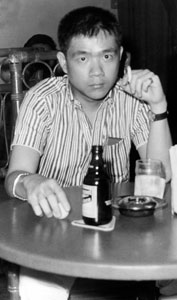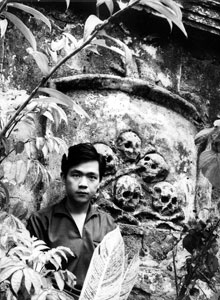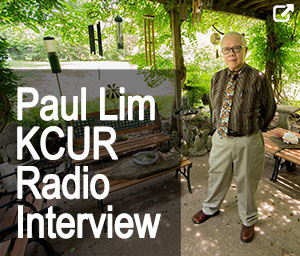Although I emigrated to the United States in 1968, my mother did not come to visit me in Kansas until August of 1976, after she had already been in America for four months. The reason why she decided to make the long journey from the Philippines was because my play Conpersonas was being performed in April of that year at the Kennedy Center in Washington, D.C., and also because (I think) she finally realized I was never going to be a doctor or a businessman, so she might as well see what I was really up to.
I was still in Kansas when my mother’s early-morning flight on Philippine Air Lines landed at Dulles International Airport in Washington. I was arriving later the same day, but I had made arrangements for someone to meet her at Dulles, and to check her into the room which had been reserved for her at the Watergate Hotel, right next door to the Kennedy Center. I was about to leave the house for my own flight to D.C. when the telephone rang. It was her.
“Why weren’t you at the airport to meet me?” my mother asked hysterically. She had been flying for nearly 16 hours, had been in transit for over 30 hours, probably hadn’t slept a wink, and had probably been terrified of going through U.S. Immigration and Customs all by herself. “What kind of a son are you?”
“Mom,” I reasoned with her, trying my best to explain that I had no control over airline schedules, but that I would be at the Watergate in time to have dinner with her.
“Hurry! I’m hungry!” she wailed.
“Order something from Room Service.”
“It’s okay. I’ll wait for you. But hurry.”
“I’m on my way.”
“Take a taxi. It will be faster.”
To this day, I don’t know if my mother was trying to be funny with that remark, or whether she really had no idea that, unlike the places in Manila that she frequently visited and patronized, Lawrence, KS was not a short cab ride away from downtown Washington D.C.
But, back to the momentous event at the Kennedy Center. If nothing else, I think my Chinese mother was truly impressed by the fact that my play in English was being performed by Caucasians, in front of mostly Caucasians, at the Kennedy Center. Although Conpersonas was a serious drama about identical twin brothers who commit suicide within hours of one another, my mother sat through the entire performance at the Eisenhower Theater with an enormous grin on her face. She might as well have been watching My Fair Lady or The Sound of Music. She had been introduced from the stage earlier in the evening, so people knew where she was sitting. If anyone in the audience had seen her beaming happily as the two unhappy brothers in the play shot and killed themselves, they might have jumped to wrong conclusions as to why I had left the Philippines, why I had safely chosen to keep my mother 7,000 miles away from me.
In any case, to my great surprise, after the hoopla of Conpersonas at the Kennedy Center was over, instead of returning with me to Lawrence, KS, where I had already been teaching as a Graduate Teaching Assistant in the English Department at the University of Kansas, my mother decided to spend some time with her friend Helen from the Philippines, whom she hadn’t seen for some time, who was now living in Brooklyn. “Helen never graduated from college,” my mother confided, “but already she is running her own business in Chinatown!” My mother thought it might be fun to live with Helen for a while, perhaps even work for her for a while.
Hard as I tried, I could not picture my mother working in a sweatshop alongside all the illegal immigrants from China and Hong Kong packed to overflowing on the second floor of an old building in Chinatown that probably should have been condemned years ago . And I was terrified that she might get mugged in the subways. But there was no dissuading her. In the Philippines, my mother was accustomed to having servants attending to her every need, chauffeurs driving her everywhere. But now she was determined to be independent, to earn her own keep in America, just like an American, walking the mean streets of Lower Manhattan, daring anyone to mug her, in the subway or anywhere else. “Don’t worry about me,” she said. “Go back to Kansas. I’ll be fine in New York with Helen. She is like a daughter to me. She will treat me like her own mother. If I get mugged, it will be God’s will, because I would not be here in America had you not invited me to come and see your play about those two brothers who killed themselves at the Kennedy Center.”
And so, with a heavy heart, I deposited my mother with Helen in Brooklyn. But, before I left, I cautioned my mother never to look anyone in the eye when she’s out and about, never to argue with anyone who accosts her and, most importantly, to carry at least $20 at all times on her person, so she can give it to anyone who wants to rob her, to keep muggers from harming her because she wasted their time when they could have been mugging other rich old ladies. My mother looked at me oddly, as though I were in cahoots with her would-be muggers, but I wouldn’t leave until she promised. And so she did.
Months went by. I called my mother two or three times a week from Kansas, and was delighted to hear that she loved New York, that she was “Miss Popularity” in the sorority of sweatshop sisters, and that she had yet to be mugged. According to my mother, Helen’s “factory” was turning out high-end clothing for fancy department stores like Bloomingdale’s, and it was her job to inspect the lingerie which were coming off “the assembly line.” She was Inspector #17, and she tucked a slip of paper into every piece of lingerie after she was done inspecting it, signifying that the garment had been inspected by Inspector #17.
I used to daydream about anyone who might have bought any lingerie at Bloomingdale’s on Lexington Avenue and 59th St. in New York City between early May and mid-August of 1976. Chances are my mother had her finger on the unmentionables of unsuspecting shoppers like Kim Novak or Jane Fonda long before they slipped them on (or off) to charm their beastly bedmates.
When being Inspector #17 finally lost its glamour in that non-air-conditioned loft in Chinatown in the heat of August in New York, my mother decided it was time to visit me in Lawrence, KS. Her arrival had been much anticipated by all my friends and colleagues at the University of Kansas. She was going to stay for a couple of weeks, so I prepared a bedroom for her on the upper level of the house, with a bathroom all to herself. I was giving a cocktail party for her. Lovely finger sandwiches were being prepared by a woman who was nearly blind, who lived in North Lawrence. The only way I could ever find her house was by the three-foot tall statue of the Blessed Virgin Mary she had out on her lawn. A bartender had been hired to mix and serve drinks, and to help clean up the place afterwards. Invitations had been sent out to 75 people, and everyone had accepted.
When the appointed day arrived, my mother emerged from her bedroom, resplendent in one of the many bejewelled evening gowns she had brought with her from Manila, one of which she had worn the evening of my play at the Kennedy Center, but the others she had had no occasion to wear in Brooklyn or the sweatshops in Chinatown. She was a big hit at the party, a merry widow too young to have a son like me. Everyone loved her. No one suspected her secret life as Inspector #17.
The morning after the night before, sometime around 6:30 A.M., I heard my mother scratching on my bedroom door. “Paul! Paul!” she whispered.
“What? What time is it? Why aren’t you still in bed sleeping?”
“Paul! Paul!” she repeated, more urgently. “Did you take the toothpaste from my bathroom upstairs?”
“What’re you talking about? Why should I take your toothpaste? Go back to bed, please.”
She went away, but only briefly. Moments later, she was again outside my room, scratching on the door. “Paul! Paul!” again she whispered.
“What is it now?”
“Did you take the Revlon Blush-On from the bathroom upstairs?”
“What Revlon Blush-On? What in God’s name are you talking about?”
“My Revlon Blush-On. You know, for my make-up. I cannot go out without my Revlon Blush-On.”
“Oh, for God’s sake. What on earth would I do with your Revlon Blush-On?”
There was no going back to sleep, so we searched through all the drawers in her bathroom upstairs. The guests at the party had been using that bathroom all night. All her travellers checks were still there, as were some of her more common everyday jewelry. Nothing was missing except her toothpaste and her Revlon Blush-On. It was a big mystery. My mother burst out laughing. She laughed so hard the tears rolled down her cheeks. She laughed so hard, her knees were weak, and she had to sit on the toilet. I’ve never heard her laugh like that, ever.
“What? What’s so funny?”
“I lived for four months in New York, and nothing happened to me,” she howled. “Everyday, I put $20 in my purse like you told me, to give to muggers, and no one ever mugged me. But I come to Lawrence, Kansas to meet your friends, and someone goes into the bathroom during the party and steals my toothpaste and my Revlon Blush-On!”
A couple of days later, when I was telling this story to some friends from the Theatre Department who had not been able to attend the party because they were in rehearsal with a play, one of them snapped to attention
“Wait a minute,” she exclaimed. “at one of our parties, the morning after, we discovered that someone had taken the Johnson’s Baby Shampoo!”
Others began to remember losing similar sorts of things from their bathrooms after parties of one sort or another. Nothing valuable. Always small, inconsequential items. A bathroom freak was among us! An academic klepto! We began to compare the guest list at these parties, and it did not take long before we thought we had our man…or woman. No way of proving it, of course, but when I described the woman in question to my mother, she lit up immediately. She remembered the woman, a recent arrival from Poland.
“Why, yes,” my mother laughed. “That woman asked me how I managed to keep my skin so soft, and I told her that the only make-up I use is Revlon Blush-On!”
Mystery solved.
After that first visit in August of 1976, my mother has been back to see me in Kansas three or four more times, and each time she doubles up laughing whenever I tell people about how she once dazzled an “admirer” in Lawrence with her pearly white Asian teeth and her blushing pink cheeks.
My mother is now 86 years old, living in Manila with my married sister, her husband and their three children. It has been thirteen years since she has visited me in Kansas. If she is reading this now, I doubt if the story will make her double up and laugh, like she used to. I don’t know if she will remember the story at all.
My mother is suffering from Alzheimer’s. My sister says that, these days, our mother just sits there all day, not recognizing anyone, but she smiles whenever she feels a friendly presence nearby. I hope she is smiling right now because it’s Mother’s Day. She has had many sorrows in her remarkable life, which I’ve written about in my play Mother Tongue, so perhaps it is a blessing that she no longer remembers the wars in China and the Philippines that she has lived through, the children she bore who should not have died so young. Although my sister, my brothers and I now choose to remember only the happy times we’ve had in each other’s company, someday we too will forget that we were ever even happy together.













